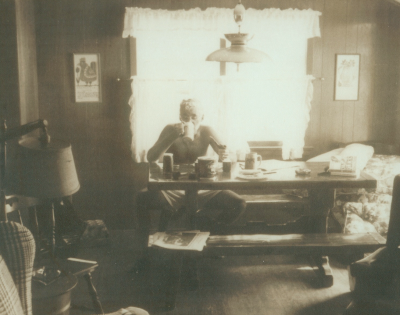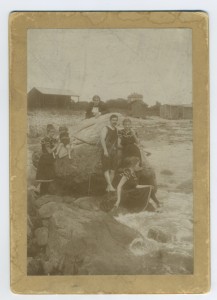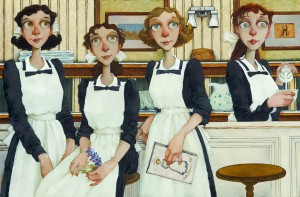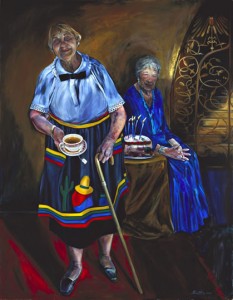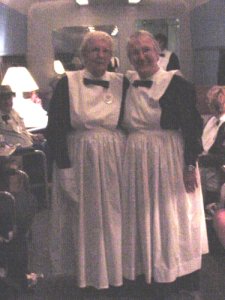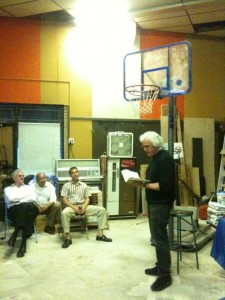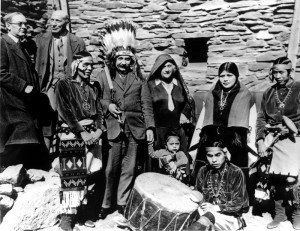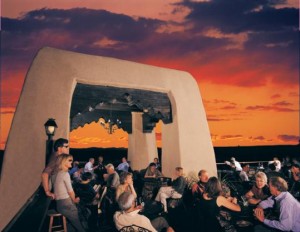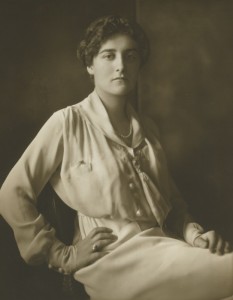From my last book “Husbandry” (Bantam 2007)
I am haunted by fathers.
Most men are. Some are haunted while their fathers are still alive. But almost all of us become haunted after our fathers die.
I am reminded of this more often than I care to admit. Holidays, birthdays, every time I take a walk on the beach. Every great sunrise and sunset (he always made you stop whatever you were doing to watch). Often during movies, TV dramas, even those cloying commercials that made Robert De Niro bawl in Analyze This.
But, I must say, Father’s Day is the worst, and not only for the obvious reasons. It was just after Father’s Day ten years ago that I found out my dad, then only sixty-one, was not going to live much longer. The next time we were all together, a few weeks later at the family shore house, where we pretended everything was going to be okay and went through our rituals of sea-glass hunting, horseshoe pitching, and seafood gluttony, he already knew he was facing the death penalty for not having gotten a colonoscopy.
The last seven months of his life were extraordinarily powerful for me. I will never let go of them, and they will never let go of me. So I think a lot about how the death of a parent affects a guy, both as a man and as a husband.
Men are often very different — to themselves, and to their spouses — after losing their fathers. In some marriages, it might be the first time a wife has ever seen her husband express (or openly struggle with not expressing) strong emotion. That’s because it’s almost impossible to remain stoic once you’ve been inducted into the Dead Fathers Society.
And it is a society. Anyone whose father is still alive really can’t understand. You can sympathize, I hope, but not really understand. And, in some marriages, I’m guessing that’s a big problem. Here your husband is finally expressing emotion, and it’s not one you recognize or know how to deal with.
My wife, Diane, has weathered my membership in the Dead Fathers Society pretty well. She has never given me the “snap out of it” speech that many spouses deliver — out loud or through their actions — once they realize that grieving lasts so much longer than sympathy. And she has always responded to my need to be comforted, which is one of the most crucial things in any relationship.
Still, I think she is mystified by my need to remind myself of my loss, to purposely make myself upset by it. I’ll watch the male version of a chick flick, A River Runs Through It, every time it’s on — and it’s on a lot — because all the fishing and the intergenerational intensity reminds me of my father and brothers. Dad always took us fishing when we were kids, so for his sixtieth birthday we took him to Canada for an amazing fishing trip, which a friend dubbed A River Runs Jewish.
Diane doesn’t know why I would subject myself to such deliberate heart wrenching. But I know why. If I don’t purposely make myself upset about losing my father, the emotion will sneak up on me when I least expect it. This way I can sort of control my out-of-control reactions.
If this makes no sense to you, don’t be in a hurry to understand it. Once you’re in the society, it’ll make way too much sense.
There has been some intriguing research on how losing a parent affects adult children, as individuals and in their marriages. Sociologists at the University of Texas even studied the differences between losing your father or your mother. While both devastate in their own way, the death of a mother was shown to cause more psychological distress, while fathers’ deaths drive more people to drink–especially if your father drank. (Married men who lost hard-drinking dads increased their own alcohol consumption by about one hundred drinks a month.) When married people lose their mothers, they report a decline in support from their spouses and an increase in their spouses’ negative behaviors (arguing, drinking, having affairs). The death of a father is more associated with a decline in overall “relationship harmony.”
So, basically, when we join the Dead Fathers Society — and, statistically, fathers die first — we become more difficult to live with, to ourselves as well as to our spouses. In the Dead Mothers Society, we look to our spouses more for support — maybe to replace what our mothers were giving us — and often don’t get what we need.
Either loss can create an incredibly risky marital moment. If you don’t figure out how to be there for your spouse during this time of need (based on their assessment of need, not yours), you may never be forgiven. But if you do learn how to share “good grief”—which isn’t easy because resources are few and expert opinions hard to come by–it can save your life together. I’ve now watched way too many of our friends go through what Diane and I did ten years ago. Fortunately, the experience has made more couples than it has broken.
As for me, I do my best to survive each Father’s Day. And then, the weekend after, Diane and I and our families make our annual pilgrimage to the family beach house. It’s a tradition we began as a way of coping with my father’s death, because nowhere is the spirit of Jerry Fried more present than at the shore. If I’m going to be haunted, I’d rather be haunted in the sun, with sand between my toes and the sound of squealing children and seagulls in my ears, searching the shallow surf for those exquisitely misshapen pieces of sea glass, the junk turned to jewels that link me to him.
